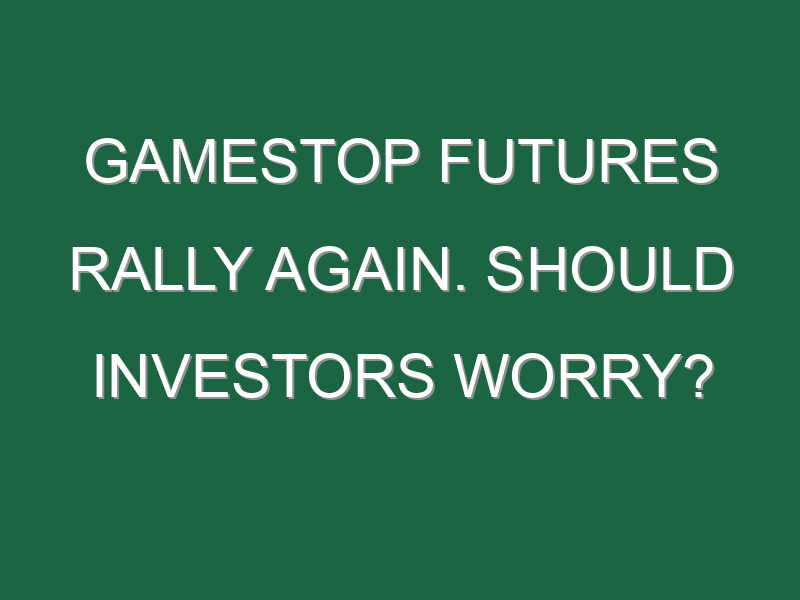This is the web version of the Bull Sheet, Fortune’s no-BS daily newsletter on the markets. Sign up to receive it in your inbox here.
Good morning, Bull Sheeters. U.S. futures are in the green on the back of strong results from Amazon and Alphabet’s Google yesterday. But, don’t look now: GameStop is up 11% in pre-market, and rising.
Why should you care about this hobbled retail stock? Because, for the past week, we’ve seen a pattern emerge: when the meme-stonks fall, the rest of the market goes up, and vice versa. Can we break that pattern today?
Meanwhile, in Europe, investors were cheering the possible return of Super Mario to helm the EU’s third biggest economy. That’s a story that hits close to home.
Let’s see what’s moving the markets.
Markets update
Asia
- The major Asia indexes are mixed in afternoon trading, with Japan’s Nikkei up 1%.
- Alibaba was down nearly 4% on Wednesday in Hong Kong despite the e-commerce giant posting better than expected results at the close on Tuesday. Fortune‘s Naomi Xu Elegant explains why investors are so jittery about its future.
- Kia Motors shares were up as much as 14.5% in Seoul on a report that Apple would invest 4 trillion won ($3.6 billion) to co-develop electric vehicles. A similar Apple rumor sent Hyundia shares skyward a few weeks prior.
Europe
- The European bourses were gaining out of the gates with the Stoxx Europe 600 up 1% at the open.
- In a few hours Italy may have a new Prime Minister, and it’s a familiar face: former ECB chief Mario Draghi. If you heard a squeal of delight around 9:30 p.m. Rome time last night, that probably would have been my wife when we all learned Mario “Whatever it takes” Draghi is likely the next man up. Investors also cheered Super Mario this morning with the Milan’s FTSE MIB soaring 2.2% at one point. The euro is up, too.
- Russia’s 2-dose Sputnik V vaccine scored promising results—91.6% efficacy—The Lancet medical journal reported yesterday, presenting COVID-socked countries with an enticing new option.
U.S.
- U.S. futures have been higher all morning. That’s after the major indexes rallied again on Monday.
- Shares in Amazon are up a whisker in pre-market this morning after Jeff Bezos‘s bombshell announcement that he’ll step down as CEO this summer.
- The big mover this morning at the bell could be Alphabet’s Google, up 7.5% in pre-market after posting a big beat yesterday, helped by its cloud and digital advertising businesses.
Elsewhere
- Gold is flat, trading around $1,836/ounce.
- The dollar is flat.
- Crude is up again, with Brent trading above $58/barrel. Neither my wife nor I have been to the local benzinaio (gas station) in two months. Just sayin’.
- As of 10 a.m. Rome time, Bitcoin was up nearly 6% at $36,000.
***
Who’s got your back?
New Yorkers of a certain age may recall the doomed-from-the-get-go startup Priceline WebHouse Club, a name-your-price grocery venture (you could also get cheap gasoline, too) launched at the height of the crazy dot-com days, in late 1999. I was a big fan. I could pop into my neighborhood Gristedes on 97th Street and fill my shopping cart with Pop-Tarts, milk, you name it, and, at check-out, marvel at the savings. There was a kind of gameshow element to it: Would my grocery tab be slashed in half today? By one-third?
It was the brainchild of Priceline founder Jay S. Walker, and was backed by the likes of Saudi Arabia’s Prince Al Waleed and Goldman Sachs’ venture arm.
In early 2000, I went to Walker’s Connecticut office to interview him about how it works, and to get the goods on his plans to roll it out across the country. The key, he told me, was the big food manufacturers. The premise was these household brands would subsidize my groceries in exchange for real-time data on the buying habits of shoppers like me.
Walker’s vision was to bust up the ancient rules of marketplace commerce. It was the “tyranny of retail,” he told me, that must bend to the rules of the digital economy. I filled my notebook with great Walker quotes, and headed back to Manhattan to write up the piece.
There was a problem with Walker’s story. It didn’t check out. Nobody was playing ball, I soon learned. I rang up every brand I could think of: P&G, Johnson & Johnson, Coca-Cola. Not one of them was paying Walker a dime. (They were intrigued by the idea, I recall, but not enough to write him a check.) It turns out Goldman Sachs, the prince and other early WebHouse investors were the ones paying for my groceries, a delicious detail that we played up big in a piece I wrote for the now-defunct Industry Standard. (Again, people of a certain age…)
The story of the rise and fall of WebHouse would get splashed across many a front page in 2000, a tough year for tech investors. It would also become the subject of a fair number of business school case studies. It became a symbol, like Pets.com, of the many flawed business ideas of that era that still succeeded in raising massive sums of start-up capital. For me, it became a symbol of the lengths VCs and investment funds would go to get in early on a buzzy dot-com.
I was reminded of that story this week when the news broke around Robinhood phoning its backers, seeking more than $1 billon. The popular trading app needed an emergency infusion of funds to cover a surge in customer trades. The idea that VCs were ultimately footing the bill for a tsunami of zero-commission trades on GameStop and AMC Entertainment sent my mind back to those go-go-go days of 2000. It’s a delicious detail in a markets tale that we’ll be talking about for years.
And, yes, you’re right. There truly is nothing new under the sun.
***
Have a nice day, everyone. I’ll see you here tomorrow… Until then, there’s more news below.
Bernhard Warner
@BernhardWarner
[email protected]
As always, you can write to [email protected] or reply to this email with suggestions and feedback.




